|
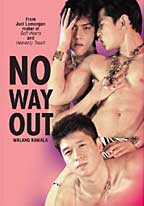
No
Way Out
Walang Kawala
Waterbearer
Films
2008
Director
Joel Lamangan
Screenplay:
Enrique Ramo
Starring:
Polo Ravales, Joseph Bitangcol, Emilio Garcia, Jean Garcia, Paolo Rivero,
Althea Vega Unrated, 97 minutes
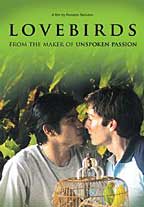
Lovebirds
Waterbearer
Films,
2008
Director/Screenplay:
Ronaldo Bertubin
Starring:
Joseph Izon, Andres Alexis, Tommy Abuel, Boots Anson-Roa
Unrated,
93 minutes

Daybreak
Waterbearer
Films,
2008
Director:
Adolfo Alix Jr
Screenplay:
Charliebebs Gohetia
Starring:
Coco Martin,
Paolo Rivero
Unrated,
65 minutes
|
Orient
Express
by
Michael D. Klemm
Posted online September, 2010
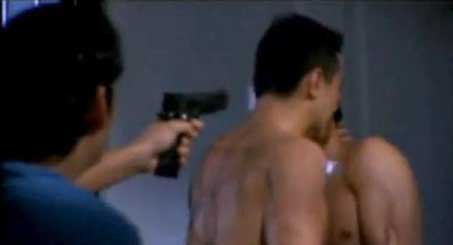
From
the Philippines comes 2008's No Way Out (Walang
Kawala). This offbeat film was directed by Joel Lamangan
from a screenplay by Enrique Ramos. A watered down Indonesian version
of Quentin Tarantino, No Way Out
juggles genres to produce an often powerful, though ultimately uneven,
crime thriller and gay romance.
|
|
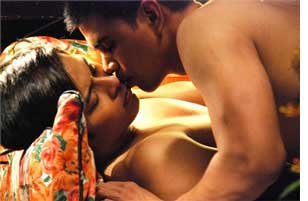 The
early exposition is very funny. Joaquin (Polo Ravales) makes his living
as a fisherman on the coast. We learn that he has been carrying on an
affair with a younger man named Waldo (Joseph Bitangcol) while his wife,
Cynthia (Althea Vega), has been working overseas for two years. Describing
her as being sex starved upon her return would be an understatement. She
throws herself at her husband with the intention of getting pregnant as
soon as possible. The bored looks on Joaquin's face, as his wife ravishes
him, are priceless. The
early exposition is very funny. Joaquin (Polo Ravales) makes his living
as a fisherman on the coast. We learn that he has been carrying on an
affair with a younger man named Waldo (Joseph Bitangcol) while his wife,
Cynthia (Althea Vega), has been working overseas for two years. Describing
her as being sex starved upon her return would be an understatement. She
throws herself at her husband with the intention of getting pregnant as
soon as possible. The bored looks on Joaquin's face, as his wife ravishes
him, are priceless.
|
|
 Waldo
is furious with the situation and flees to Manila. Joaquin has undoubtedly
enjoyed his wife's absence, coming to terms with his homosexuality in
the process. He realizes that he loves Waldo and heads to the big city
so that he can search for him. Joaquin's quest leads him into Manila's
sleazier quarters. At a strip club, Joaquin learns that Waldo was last
seen in the company of Rufo (Emilio Garcia), a bisexual cop who traffics
in human slaves, selling them "like fish." Can Joaquin find his beloved
and save him before it's too late? Waldo
is furious with the situation and flees to Manila. Joaquin has undoubtedly
enjoyed his wife's absence, coming to terms with his homosexuality in
the process. He realizes that he loves Waldo and heads to the big city
so that he can search for him. Joaquin's quest leads him into Manila's
sleazier quarters. At a strip club, Joaquin learns that Waldo was last
seen in the company of Rufo (Emilio Garcia), a bisexual cop who traffics
in human slaves, selling them "like fish." Can Joaquin find his beloved
and save him before it's too late?
|
|
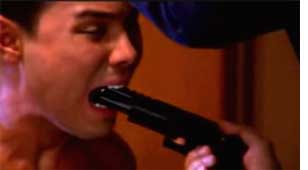 There
is much in this film to admire but it also, quite frankly, a very schizophrenic
movie. It begins as a soft porn screwball comedy. Then it explodes into
melodrama. The staging of the violence, when the action moves to Manila,
is sometimes a bit clumsy but it also gets pretty ugly - almost unbearably
so. Two male rapes at gunpoint are clinically brutal. There are many flashbacks
that augment the love story between Joaquin and Waldo. This helps, because
too many clashing styles keep the film from gelling into a cohesive whole.
Regrettably, the ending is also a mess; methinks the director doesn't
believe in Hitchcock's
maxim that you have to relieve suspense after spending so much time setting
it up. There
is much in this film to admire but it also, quite frankly, a very schizophrenic
movie. It begins as a soft porn screwball comedy. Then it explodes into
melodrama. The staging of the violence, when the action moves to Manila,
is sometimes a bit clumsy but it also gets pretty ugly - almost unbearably
so. Two male rapes at gunpoint are clinically brutal. There are many flashbacks
that augment the love story between Joaquin and Waldo. This helps, because
too many clashing styles keep the film from gelling into a cohesive whole.
Regrettably, the ending is also a mess; methinks the director doesn't
believe in Hitchcock's
maxim that you have to relieve suspense after spending so much time setting
it up.
|
|
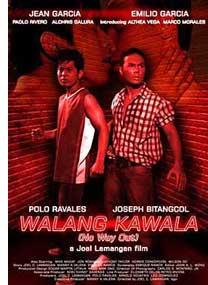 Why
is it that so many Asian films insist on New-Age accoustic guitar and/or
piano scores that sound "too Western?" As in many other films
from the Orient, the music stops the movie dead in its tracks every time
that the wafting strings return. The documentary approach to the ugly
events being filmed works better with silence. The love story could have
been stronger and the ending better but, flaws and all, No
Way Out is a credible and creepy film. The scenes of sexual
abuse are raw and devoid of anything remotely resembling eroticism - a
far cry from those soft porn beefcake gay crime thrillers and horror films
that clutter our cinematic landscape. This is what separates art from
exploitation. The villains are amongst the most repulsive I have ever
seen on the screen. To its credit, the film is also not "about" homosexuality;
the main characters just happen to be queer. Why
is it that so many Asian films insist on New-Age accoustic guitar and/or
piano scores that sound "too Western?" As in many other films
from the Orient, the music stops the movie dead in its tracks every time
that the wafting strings return. The documentary approach to the ugly
events being filmed works better with silence. The love story could have
been stronger and the ending better but, flaws and all, No
Way Out is a credible and creepy film. The scenes of sexual
abuse are raw and devoid of anything remotely resembling eroticism - a
far cry from those soft porn beefcake gay crime thrillers and horror films
that clutter our cinematic landscape. This is what separates art from
exploitation. The villains are amongst the most repulsive I have ever
seen on the screen. To its credit, the film is also not "about" homosexuality;
the main characters just happen to be queer.
|
|
 A
glance at director Lamangan's credits on imdb.com reveal quite the prolific
filmmaker. During the 70s, Lamangan was incarcerated as a political prisoner
and was tortured for his views. He made his mark on Filipino cinema with
a string of commercial hits, gaining the clout in the process to make
the films that he wants. Give the man credit for avoiding fluffy sex comedies,
during the independent phase to his career, in favor of a darker vison. A
glance at director Lamangan's credits on imdb.com reveal quite the prolific
filmmaker. During the 70s, Lamangan was incarcerated as a political prisoner
and was tortured for his views. He made his mark on Filipino cinema with
a string of commercial hits, gaining the clout in the process to make
the films that he wants. Give the man credit for avoiding fluffy sex comedies,
during the independent phase to his career, in favor of a darker vison.
|
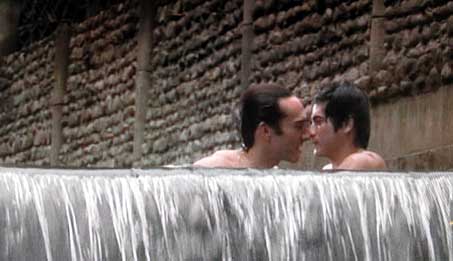 |
|
Also
from the Phlipines comes writer/director Ronaldo Bertubin's 2009 Lovebirds.
This one is a screwball comedy about culture clashes, language barriers
and mistaken identities. Mario and Alexis are international internet lovers.
Mario (Joseph Izon) lives in the Philipines while Alexis (Andres Alexis)
hails from Spain. The two men have fallen in love online and Alexis has
decided to fly to the Philipines so that they can meet in person.
|
|
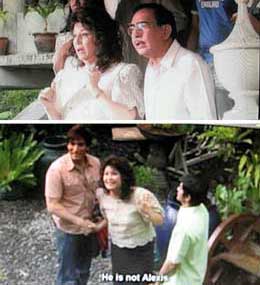 All
well and good, except that Mario's family doesn't know that he is gay
and they are expecting Alexis to be a woman. Mario's old fashioned (but
internet savvy) Mother has prepared a traditional banquet and invited
the extended family. Imagine everyone's shock when a car arrives from
the airport and out steps a handsome young man. Before our lovers
can embrace, Mario's Mother runs between them and hastily announces to
everyone that Alexis is ill and cannot be here, and that their "very special
guest" is her twin brother, Alex. Needless to say, she couldn't be a more
obvious, and desperate, liar if she tried. Goodness gracious, what will
the neighbors think? All
well and good, except that Mario's family doesn't know that he is gay
and they are expecting Alexis to be a woman. Mario's old fashioned (but
internet savvy) Mother has prepared a traditional banquet and invited
the extended family. Imagine everyone's shock when a car arrives from
the airport and out steps a handsome young man. Before our lovers
can embrace, Mario's Mother runs between them and hastily announces to
everyone that Alexis is ill and cannot be here, and that their "very special
guest" is her twin brother, Alex. Needless to say, she couldn't be a more
obvious, and desperate, liar if she tried. Goodness gracious, what will
the neighbors think?
|
|
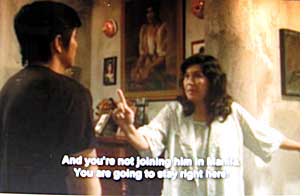 Some
early dialogue establishes that she is hardly a card carrying member of
PFLAG. Boots Anson-Roa, a very respected Filipino actress, manages to
make the Mother hateful while still providing comic relief. She can be
a tad over the top at times but it is sublime slapstick when she keeps
showing up every time the lovers are alone. "Not in my house!" she screams
at them. When she finds them in the garden, she yells "Not on my property!" Some
early dialogue establishes that she is hardly a card carrying member of
PFLAG. Boots Anson-Roa, a very respected Filipino actress, manages to
make the Mother hateful while still providing comic relief. She can be
a tad over the top at times but it is sublime slapstick when she keeps
showing up every time the lovers are alone. "Not in my house!" she screams
at them. When she finds them in the garden, she yells "Not on my property!"
|
|
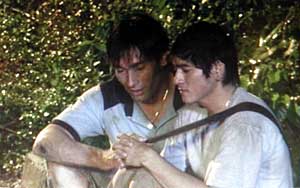 As
easy as it is to point fingers at Mother, this whole Shakesperean comedy
of errors is really all Mario's fault. He chose not to tell his family
that Alexis was a man. He also allowed his more experienced best friend,
who types faster and knows Spanish, to do his online chats for him. Thus,
Mario doesn't even know everything he typed to Alexis, causing even more
embarassment. Meanwhile, Alexi has been a very good sport about all
this but there's only so much a man can take. Can the lovebirds' romance
bloom despite all the strikes against them? As
easy as it is to point fingers at Mother, this whole Shakesperean comedy
of errors is really all Mario's fault. He chose not to tell his family
that Alexis was a man. He also allowed his more experienced best friend,
who types faster and knows Spanish, to do his online chats for him. Thus,
Mario doesn't even know everything he typed to Alexis, causing even more
embarassment. Meanwhile, Alexi has been a very good sport about all
this but there's only so much a man can take. Can the lovebirds' romance
bloom despite all the strikes against them?
|
|
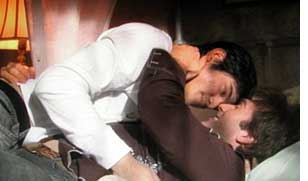 Well,
this is a romantic comedy so we know that things have to turn out well
in the end. The conclusion was too much like a sitcom for my tastes but
I still melted and said "awwww" anyway. For the most part, Lovebirds
is an enjoyable farce. While not always laugh out loud funny, it amuses.
The lovers are sweet together when they are allowed a few minutes
alone. The audience is teased for a longer time than is usual for a gay
film but, for those viewers who insist on it, gratuitous sex comes in
the form of Mario's best friend and his lover. A waterfall is the setting
for some idyllic male nudes. There is a terrific, and very real, confrontation
scene between the lovebirds that resonates on both dramatic and comedic
levels.. Well,
this is a romantic comedy so we know that things have to turn out well
in the end. The conclusion was too much like a sitcom for my tastes but
I still melted and said "awwww" anyway. For the most part, Lovebirds
is an enjoyable farce. While not always laugh out loud funny, it amuses.
The lovers are sweet together when they are allowed a few minutes
alone. The audience is teased for a longer time than is usual for a gay
film but, for those viewers who insist on it, gratuitous sex comes in
the form of Mario's best friend and his lover. A waterfall is the setting
for some idyllic male nudes. There is a terrific, and very real, confrontation
scene between the lovebirds that resonates on both dramatic and comedic
levels..
|
|
 Some
of the humor comes from the language. Most of the film is in Tagalog with
a bit of Spanish and a fair amount of English. All of it, no matter the
language, is subtitled in English - which actually makes a few scenes
funnier. Several characters, especially Mother, will speak Tagalog but
throw in an English phrase - and get the wording wrong. Some
of the humor comes from the language. Most of the film is in Tagalog with
a bit of Spanish and a fair amount of English. All of it, no matter the
language, is subtitled in English - which actually makes a few scenes
funnier. Several characters, especially Mother, will speak Tagalog but
throw in an English phrase - and get the wording wrong.
Positive
gay themed films from the Philipines are no longer the rarity they once
were, so there's nothing really new or groundbreaking about Lovebirds.
It's a cute movie though and perfect for snuggling with your date.
|
|
|
|
Last
but not least is 2008's Daybreak.
They say that good things come in small packages and this 65 minute film,
directed by Adolfo Alix Jr. from a script by Charliebebs Gohetia, is a
cinematic short story that packs a lot of emotion. Daybreak
documents the end of an affair. The clandestine lovers are two Filipino
men on the down low. William (Paolo Rivero) is a married doctor on a business
trip. JP (Coco Martin) works as boatman and sightseeing guide. The two
men met when William and his wife took a boat tour to see the Taal Volcano.
They have been having a secret affair for about a year.
|
|
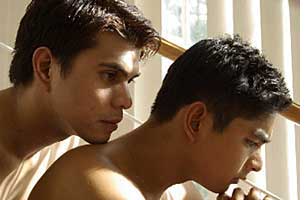 William
and JP haven't seen each other in a couple of months. They are spending
the night at William's opulent family vacation home in Tagaytay City.
The volcano can be seen from their windows. Their relationship is a bit
difficult to unravel. William is married. JP seems to have no lack of
girlfriends, all of them fulfilling until a better one comes along. Despite
seeming otherwise terminally straight, these two guys are hot for each
other. Each, unfortunately has different ideas regarding their relationship.
JP, despite all the women, sees them as a couple. William loves his wife
and considers JP to be a fuck buddy - albeit one whom he cares for deeply.
To complicate matters, William has to tell JP that he is going to be relocating,
with his wife, for a new job. William
and JP haven't seen each other in a couple of months. They are spending
the night at William's opulent family vacation home in Tagaytay City.
The volcano can be seen from their windows. Their relationship is a bit
difficult to unravel. William is married. JP seems to have no lack of
girlfriends, all of them fulfilling until a better one comes along. Despite
seeming otherwise terminally straight, these two guys are hot for each
other. Each, unfortunately has different ideas regarding their relationship.
JP, despite all the women, sees them as a couple. William loves his wife
and considers JP to be a fuck buddy - albeit one whom he cares for deeply.
To complicate matters, William has to tell JP that he is going to be relocating,
with his wife, for a new job.
That's
basically the film in a nutshell. They talk, they fight, they fuck. It's
a slice of life, both lyrical and realistic.
|
|
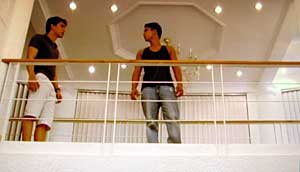 Not
much happens. We don't know a lot about the two men; only a few hints
about what makes them tick can be gleamed from their conversations. But,
because Daybreak is as short
as it is, fully developed characters aren't a prerequisite. The director
is looking to capture a moment and he does, quite splendidly. Leading
up to that moment are many others that ring with truth. JP looks annoyed
when William receives a cellphone call from his wife, just in time to
spoil the reverie they were enjoying. Most striking is a forced kiss that
is ferociously rejected and then surrendered to. Not
much happens. We don't know a lot about the two men; only a few hints
about what makes them tick can be gleamed from their conversations. But,
because Daybreak is as short
as it is, fully developed characters aren't a prerequisite. The director
is looking to capture a moment and he does, quite splendidly. Leading
up to that moment are many others that ring with truth. JP looks annoyed
when William receives a cellphone call from his wife, just in time to
spoil the reverie they were enjoying. Most striking is a forced kiss that
is ferociously rejected and then surrendered to.
|
|
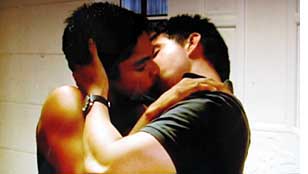 Repeated
viewings reveal riches. The cinematography is often quite beautiful. There
is atmosphere aplenty; a fog shrouded pool, the rising sun climbing up
the bedroom wall, the feet of two lovers pushing aside a pile of clothes
on the floor, a hugged pillow filling the frame that belonged to an absent
lover. Many images will stay with the viewer. Daybreak
is also a very sexy film. If, like me, you enjoy long kissing scenes,
this one is for you. There are two beautifully filmed love scenes that
percolate with passion. Eroticism extends to much of the other imagery
as well; even a shot of hands fanning spaghetti into a pot is very sensual. Repeated
viewings reveal riches. The cinematography is often quite beautiful. There
is atmosphere aplenty; a fog shrouded pool, the rising sun climbing up
the bedroom wall, the feet of two lovers pushing aside a pile of clothes
on the floor, a hugged pillow filling the frame that belonged to an absent
lover. Many images will stay with the viewer. Daybreak
is also a very sexy film. If, like me, you enjoy long kissing scenes,
this one is for you. There are two beautifully filmed love scenes that
percolate with passion. Eroticism extends to much of the other imagery
as well; even a shot of hands fanning spaghetti into a pot is very sensual.
|
|
 A
soundtrack that is often just atonal chimes is unobtrusive, lovely in
its subtlety and quietly effective. Finally, no New Age guitar or piano
in an Asian film, what a concept! Both actors do a nice job, which is
good because there is no one else in the movie. Daybreak
is a very unusual work that thinks outside the box. (The credits appear
at the film's midpoint during a lengthy one-take shot in which they eat
dinner in silence.) Smart and sweet, Daybreak
doesn't overstay its welcome. A
soundtrack that is often just atonal chimes is unobtrusive, lovely in
its subtlety and quietly effective. Finally, no New Age guitar or piano
in an Asian film, what a concept! Both actors do a nice job, which is
good because there is no one else in the movie. Daybreak
is a very unusual work that thinks outside the box. (The credits appear
at the film's midpoint during a lengthy one-take shot in which they eat
dinner in silence.) Smart and sweet, Daybreak
doesn't overstay its welcome.
|



